Marketing Report: Socially Responsible Marketing and Ethics
VerifiedAdded on 2021/12/20
|8
|1185
|22
Report
AI Summary
This marketing report delves into the concepts of socially and environmentally responsible marketing, highlighting their significance in shaping consumer behavior and maintaining ethical standards. The report examines the application of socially responsible marketing (SRM) and its impact on consumer purchasing decisions, emphasizing ethical considerations such as the lack of measurement techniques and the need for social factor attention. It also addresses environmentally responsible marketing, discussing issues like ethical concerns in advertising, deceptive marketing practices, and the challenges of using eco-friendly materials. The report explores the influence of cultural perceptions on advertising, the role of regulations, and the impact of negative advertising. It concludes by emphasizing the importance of SRM and ethical responsibility in achieving competitive advantages and building consumer trust. The report uses various sources to support its findings, providing a comprehensive overview of the marketing landscape.
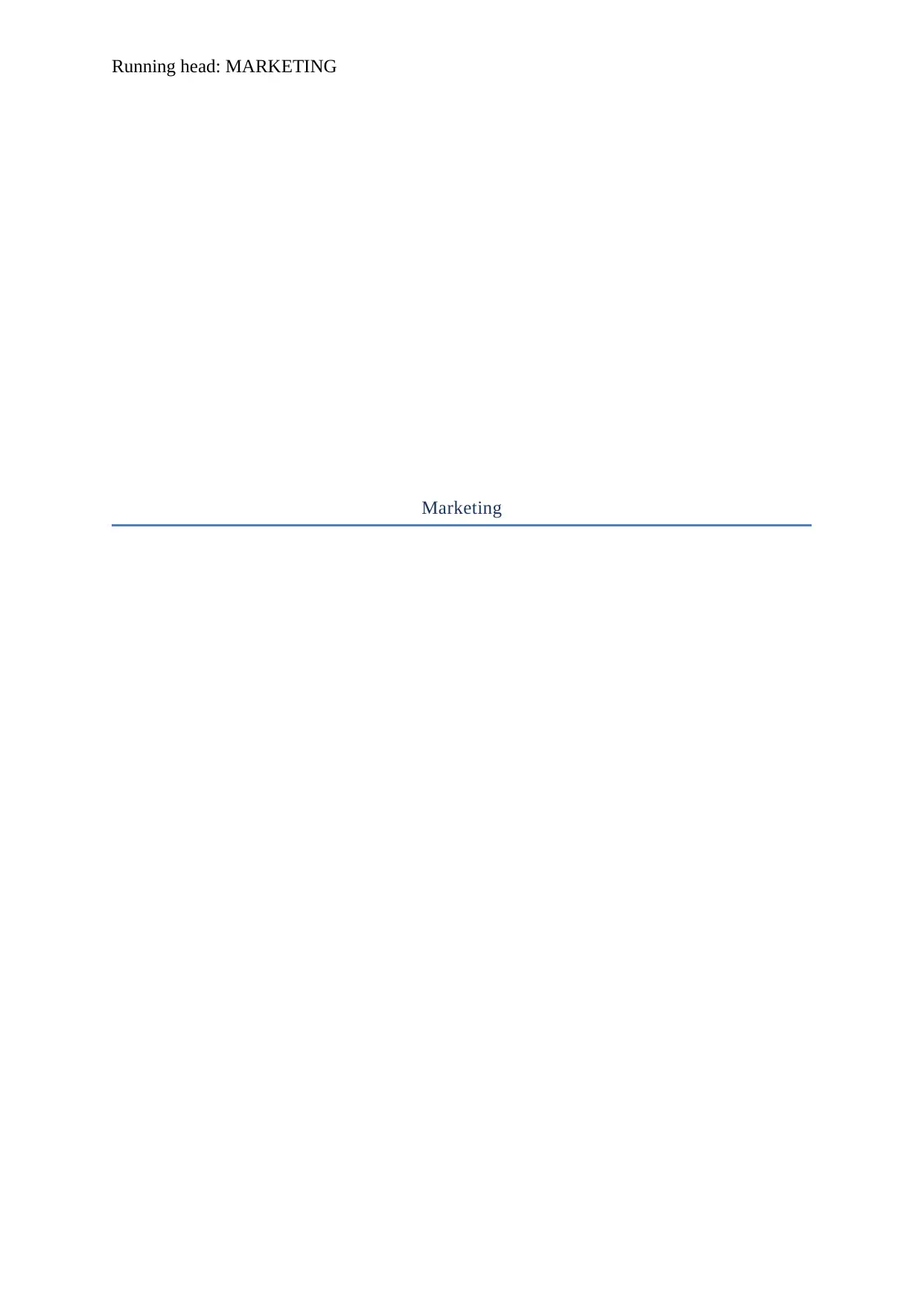
Running head: MARKETING
Marketing
Marketing
Paraphrase This Document
Need a fresh take? Get an instant paraphrase of this document with our AI Paraphraser
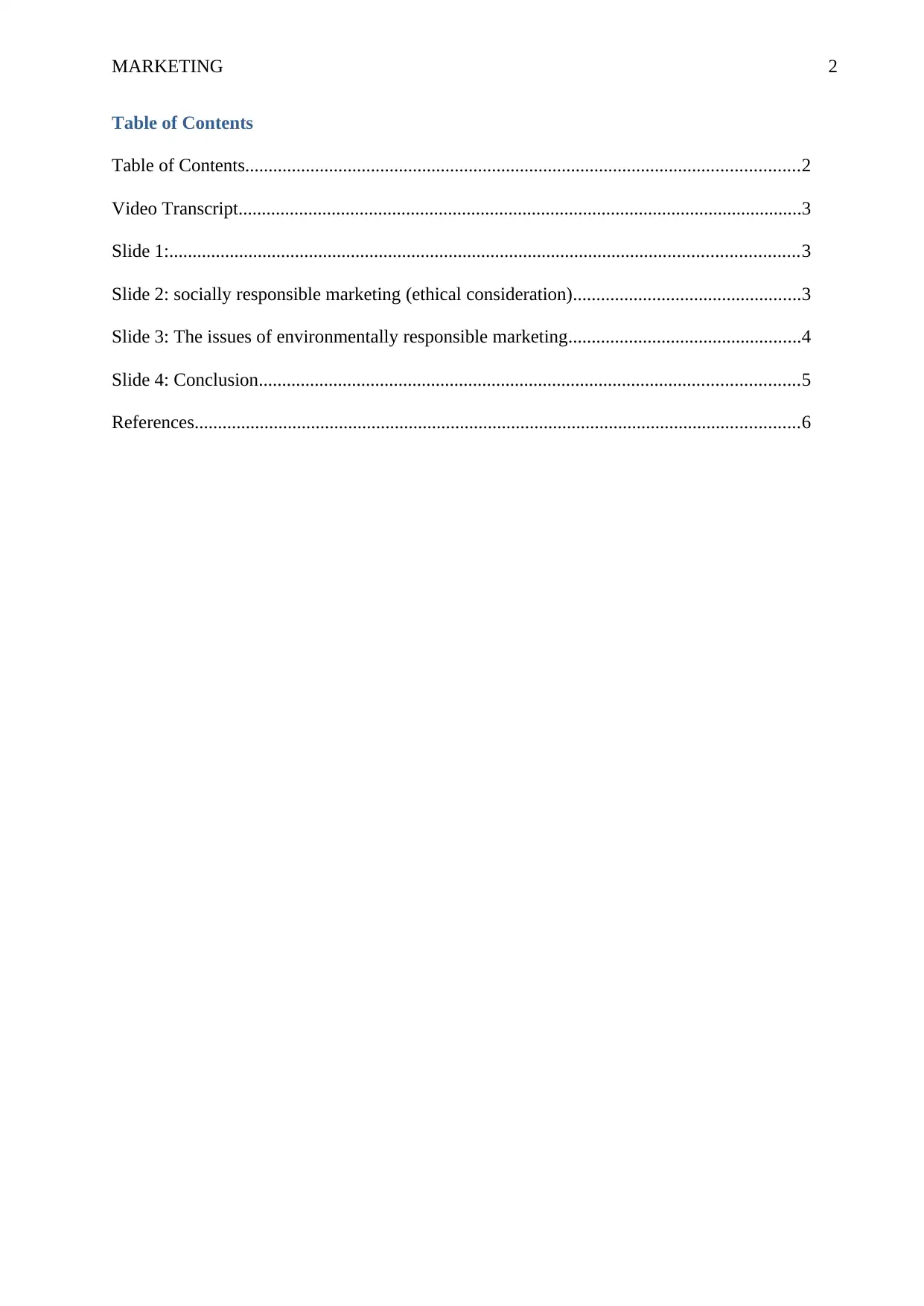
MARKETING 2
Table of Contents
Table of Contents.......................................................................................................................2
Video Transcript.........................................................................................................................3
Slide 1:.......................................................................................................................................3
Slide 2: socially responsible marketing (ethical consideration).................................................3
Slide 3: The issues of environmentally responsible marketing..................................................4
Slide 4: Conclusion....................................................................................................................5
References..................................................................................................................................6
Table of Contents
Table of Contents.......................................................................................................................2
Video Transcript.........................................................................................................................3
Slide 1:.......................................................................................................................................3
Slide 2: socially responsible marketing (ethical consideration).................................................3
Slide 3: The issues of environmentally responsible marketing..................................................4
Slide 4: Conclusion....................................................................................................................5
References..................................................................................................................................6
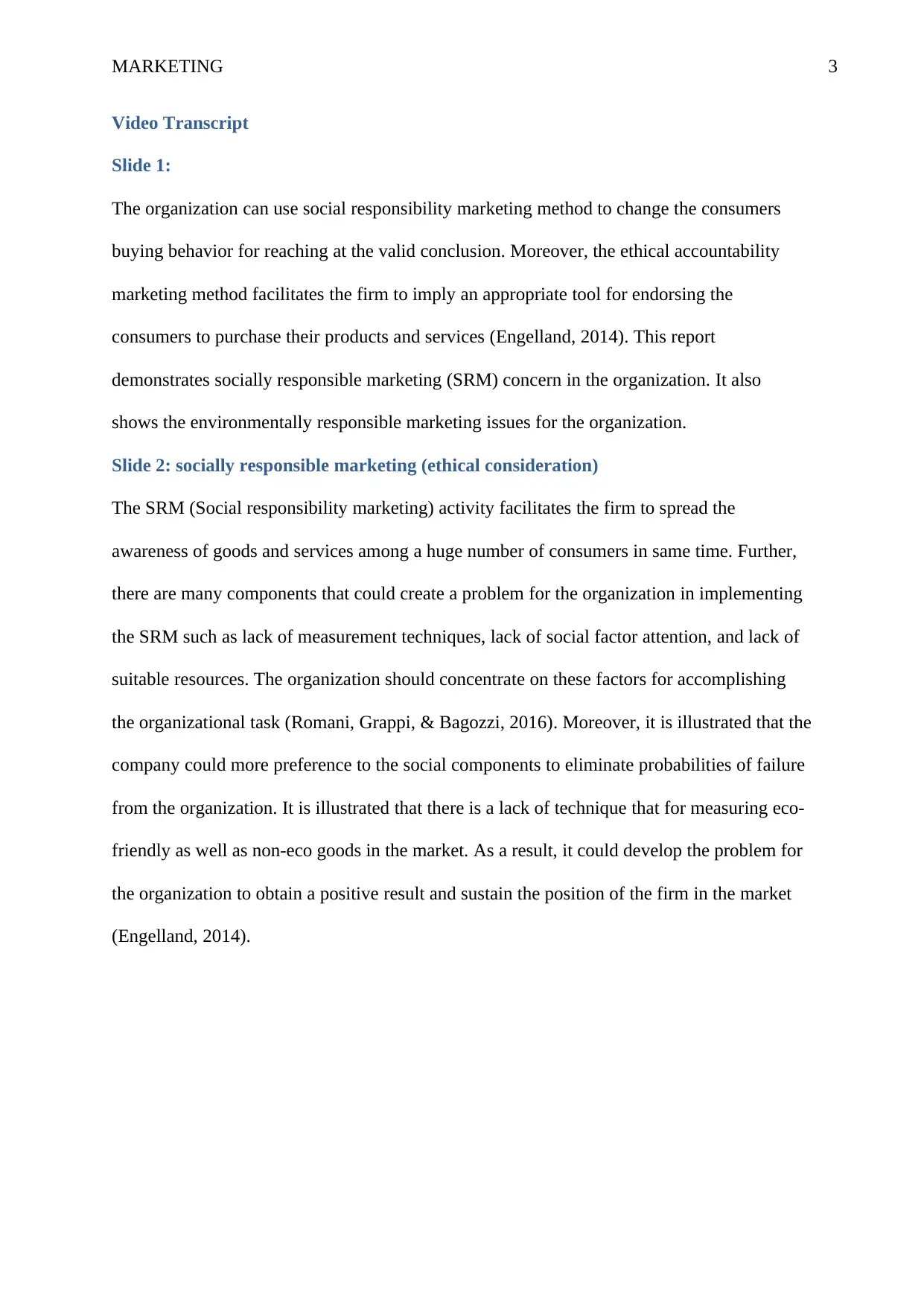
MARKETING 3
Video Transcript
Slide 1:
The organization can use social responsibility marketing method to change the consumers
buying behavior for reaching at the valid conclusion. Moreover, the ethical accountability
marketing method facilitates the firm to imply an appropriate tool for endorsing the
consumers to purchase their products and services (Engelland, 2014). This report
demonstrates socially responsible marketing (SRM) concern in the organization. It also
shows the environmentally responsible marketing issues for the organization.
Slide 2: socially responsible marketing (ethical consideration)
The SRM (Social responsibility marketing) activity facilitates the firm to spread the
awareness of goods and services among a huge number of consumers in same time. Further,
there are many components that could create a problem for the organization in implementing
the SRM such as lack of measurement techniques, lack of social factor attention, and lack of
suitable resources. The organization should concentrate on these factors for accomplishing
the organizational task (Romani, Grappi, & Bagozzi, 2016). Moreover, it is illustrated that the
company could more preference to the social components to eliminate probabilities of failure
from the organization. It is illustrated that there is a lack of technique that for measuring eco-
friendly as well as non-eco goods in the market. As a result, it could develop the problem for
the organization to obtain a positive result and sustain the position of the firm in the market
(Engelland, 2014).
Video Transcript
Slide 1:
The organization can use social responsibility marketing method to change the consumers
buying behavior for reaching at the valid conclusion. Moreover, the ethical accountability
marketing method facilitates the firm to imply an appropriate tool for endorsing the
consumers to purchase their products and services (Engelland, 2014). This report
demonstrates socially responsible marketing (SRM) concern in the organization. It also
shows the environmentally responsible marketing issues for the organization.
Slide 2: socially responsible marketing (ethical consideration)
The SRM (Social responsibility marketing) activity facilitates the firm to spread the
awareness of goods and services among a huge number of consumers in same time. Further,
there are many components that could create a problem for the organization in implementing
the SRM such as lack of measurement techniques, lack of social factor attention, and lack of
suitable resources. The organization should concentrate on these factors for accomplishing
the organizational task (Romani, Grappi, & Bagozzi, 2016). Moreover, it is illustrated that the
company could more preference to the social components to eliminate probabilities of failure
from the organization. It is illustrated that there is a lack of technique that for measuring eco-
friendly as well as non-eco goods in the market. As a result, it could develop the problem for
the organization to obtain a positive result and sustain the position of the firm in the market
(Engelland, 2014).
⊘ This is a preview!⊘
Do you want full access?
Subscribe today to unlock all pages.

Trusted by 1+ million students worldwide
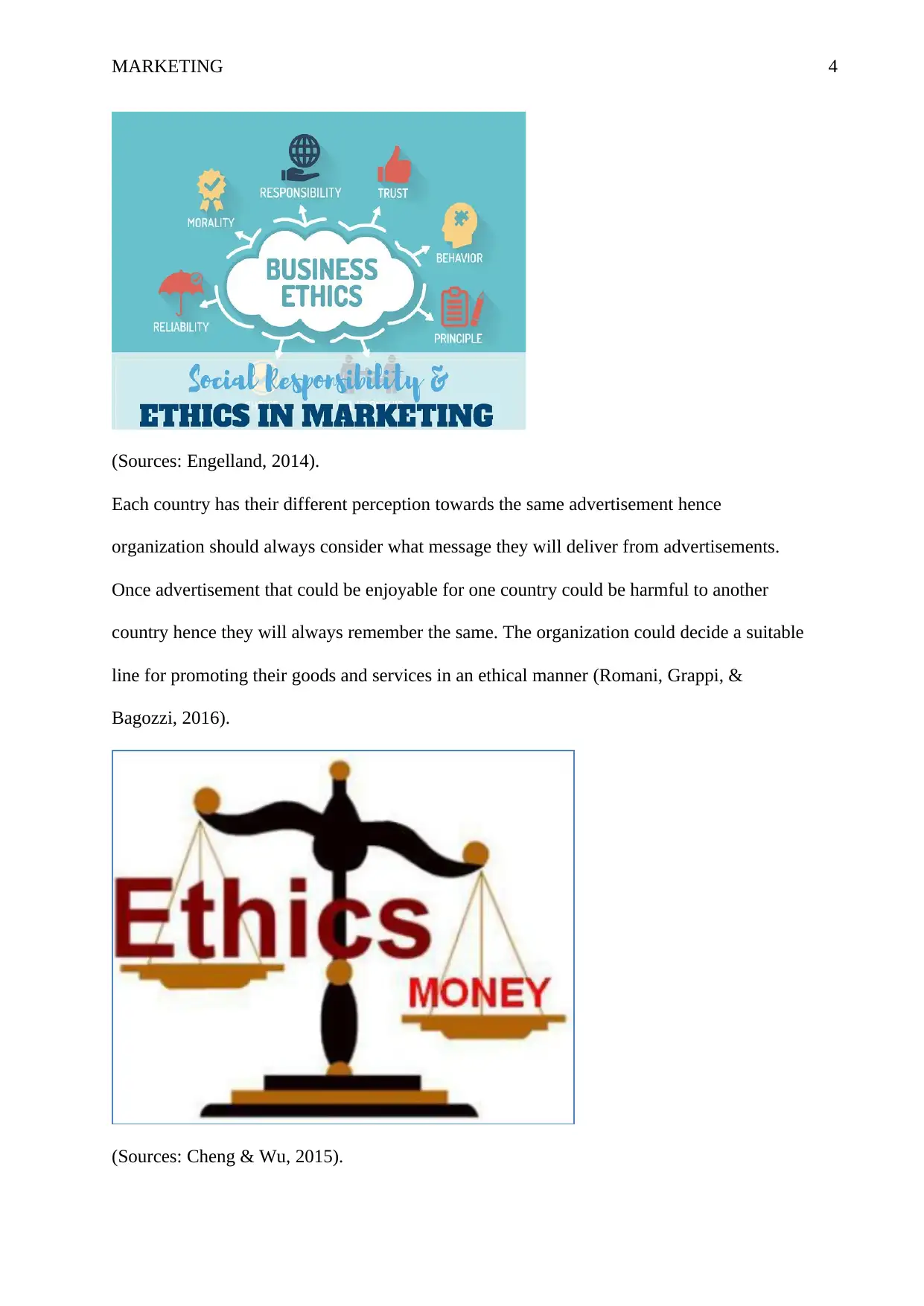
MARKETING 4
(Sources: Engelland, 2014).
Each country has their different perception towards the same advertisement hence
organization should always consider what message they will deliver from advertisements.
Once advertisement that could be enjoyable for one country could be harmful to another
country hence they will always remember the same. The organization could decide a suitable
line for promoting their goods and services in an ethical manner (Romani, Grappi, &
Bagozzi, 2016).
(Sources: Cheng & Wu, 2015).
(Sources: Engelland, 2014).
Each country has their different perception towards the same advertisement hence
organization should always consider what message they will deliver from advertisements.
Once advertisement that could be enjoyable for one country could be harmful to another
country hence they will always remember the same. The organization could decide a suitable
line for promoting their goods and services in an ethical manner (Romani, Grappi, &
Bagozzi, 2016).
(Sources: Cheng & Wu, 2015).
Paraphrase This Document
Need a fresh take? Get an instant paraphrase of this document with our AI Paraphraser
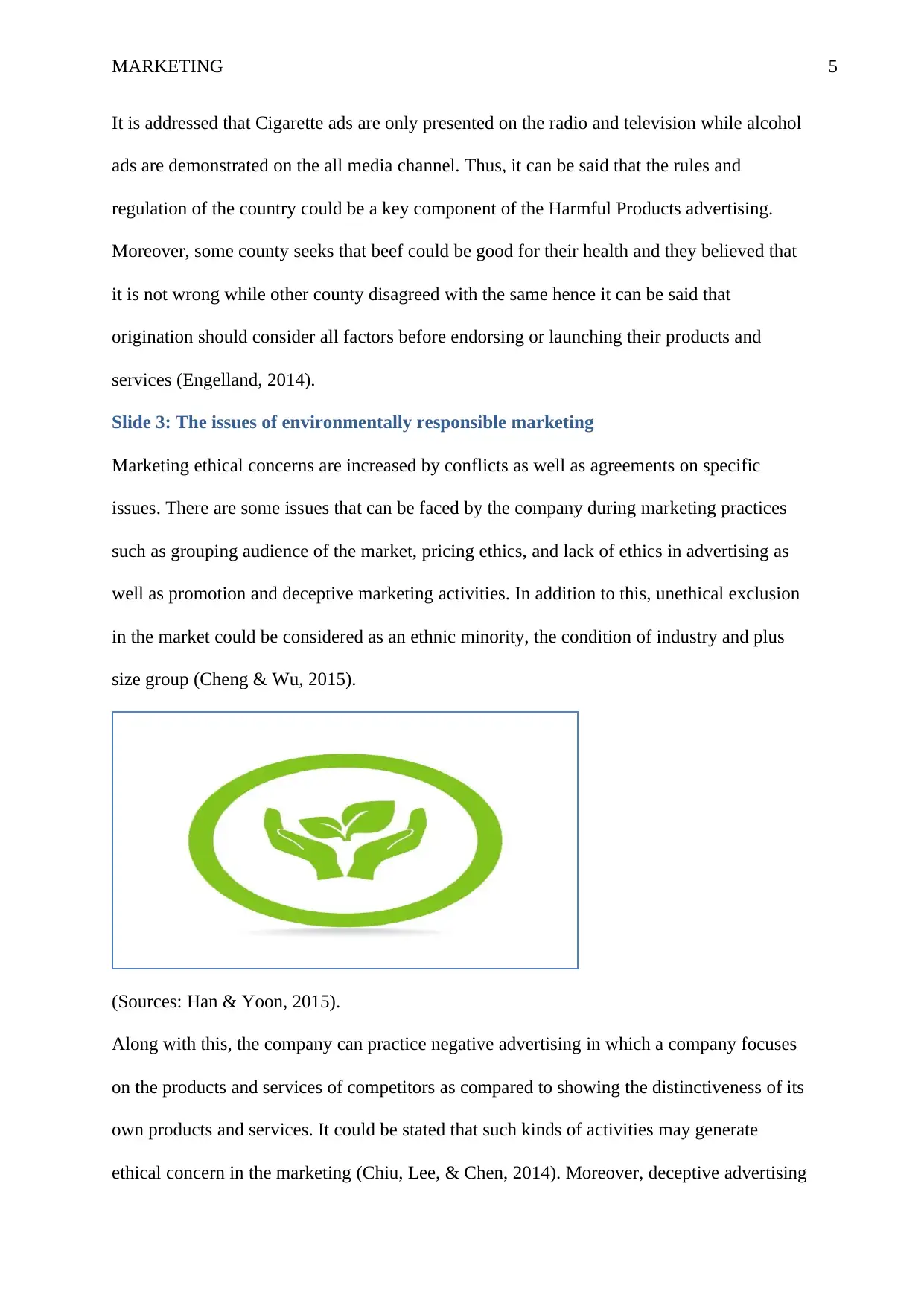
MARKETING 5
It is addressed that Cigarette ads are only presented on the radio and television while alcohol
ads are demonstrated on the all media channel. Thus, it can be said that the rules and
regulation of the country could be a key component of the Harmful Products advertising.
Moreover, some county seeks that beef could be good for their health and they believed that
it is not wrong while other county disagreed with the same hence it can be said that
origination should consider all factors before endorsing or launching their products and
services (Engelland, 2014).
Slide 3: The issues of environmentally responsible marketing
Marketing ethical concerns are increased by conflicts as well as agreements on specific
issues. There are some issues that can be faced by the company during marketing practices
such as grouping audience of the market, pricing ethics, and lack of ethics in advertising as
well as promotion and deceptive marketing activities. In addition to this, unethical exclusion
in the market could be considered as an ethnic minority, the condition of industry and plus
size group (Cheng & Wu, 2015).
(Sources: Han & Yoon, 2015).
Along with this, the company can practice negative advertising in which a company focuses
on the products and services of competitors as compared to showing the distinctiveness of its
own products and services. It could be stated that such kinds of activities may generate
ethical concern in the marketing (Chiu, Lee, & Chen, 2014). Moreover, deceptive advertising
It is addressed that Cigarette ads are only presented on the radio and television while alcohol
ads are demonstrated on the all media channel. Thus, it can be said that the rules and
regulation of the country could be a key component of the Harmful Products advertising.
Moreover, some county seeks that beef could be good for their health and they believed that
it is not wrong while other county disagreed with the same hence it can be said that
origination should consider all factors before endorsing or launching their products and
services (Engelland, 2014).
Slide 3: The issues of environmentally responsible marketing
Marketing ethical concerns are increased by conflicts as well as agreements on specific
issues. There are some issues that can be faced by the company during marketing practices
such as grouping audience of the market, pricing ethics, and lack of ethics in advertising as
well as promotion and deceptive marketing activities. In addition to this, unethical exclusion
in the market could be considered as an ethnic minority, the condition of industry and plus
size group (Cheng & Wu, 2015).
(Sources: Han & Yoon, 2015).
Along with this, the company can practice negative advertising in which a company focuses
on the products and services of competitors as compared to showing the distinctiveness of its
own products and services. It could be stated that such kinds of activities may generate
ethical concern in the marketing (Chiu, Lee, & Chen, 2014). Moreover, deceptive advertising
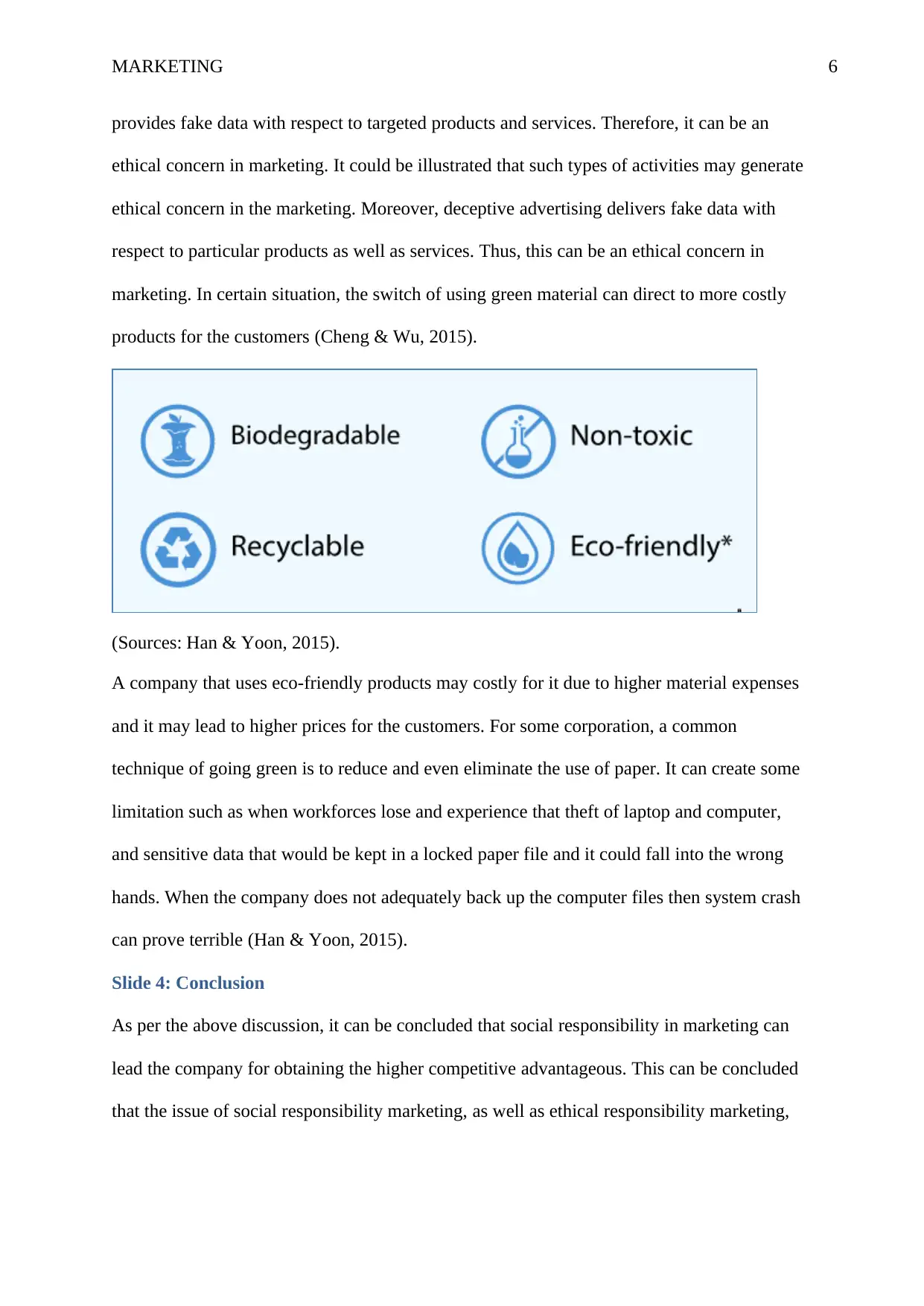
MARKETING 6
provides fake data with respect to targeted products and services. Therefore, it can be an
ethical concern in marketing. It could be illustrated that such types of activities may generate
ethical concern in the marketing. Moreover, deceptive advertising delivers fake data with
respect to particular products as well as services. Thus, this can be an ethical concern in
marketing. In certain situation, the switch of using green material can direct to more costly
products for the customers (Cheng & Wu, 2015).
(Sources: Han & Yoon, 2015).
A company that uses eco-friendly products may costly for it due to higher material expenses
and it may lead to higher prices for the customers. For some corporation, a common
technique of going green is to reduce and even eliminate the use of paper. It can create some
limitation such as when workforces lose and experience that theft of laptop and computer,
and sensitive data that would be kept in a locked paper file and it could fall into the wrong
hands. When the company does not adequately back up the computer files then system crash
can prove terrible (Han & Yoon, 2015).
Slide 4: Conclusion
As per the above discussion, it can be concluded that social responsibility in marketing can
lead the company for obtaining the higher competitive advantageous. This can be concluded
that the issue of social responsibility marketing, as well as ethical responsibility marketing,
provides fake data with respect to targeted products and services. Therefore, it can be an
ethical concern in marketing. It could be illustrated that such types of activities may generate
ethical concern in the marketing. Moreover, deceptive advertising delivers fake data with
respect to particular products as well as services. Thus, this can be an ethical concern in
marketing. In certain situation, the switch of using green material can direct to more costly
products for the customers (Cheng & Wu, 2015).
(Sources: Han & Yoon, 2015).
A company that uses eco-friendly products may costly for it due to higher material expenses
and it may lead to higher prices for the customers. For some corporation, a common
technique of going green is to reduce and even eliminate the use of paper. It can create some
limitation such as when workforces lose and experience that theft of laptop and computer,
and sensitive data that would be kept in a locked paper file and it could fall into the wrong
hands. When the company does not adequately back up the computer files then system crash
can prove terrible (Han & Yoon, 2015).
Slide 4: Conclusion
As per the above discussion, it can be concluded that social responsibility in marketing can
lead the company for obtaining the higher competitive advantageous. This can be concluded
that the issue of social responsibility marketing, as well as ethical responsibility marketing,
⊘ This is a preview!⊘
Do you want full access?
Subscribe today to unlock all pages.

Trusted by 1+ million students worldwide

MARKETING 7
can decline the demand for products as well as services and also avoid the chance of creating
trustworthy outcomes.
can decline the demand for products as well as services and also avoid the chance of creating
trustworthy outcomes.
Paraphrase This Document
Need a fresh take? Get an instant paraphrase of this document with our AI Paraphraser
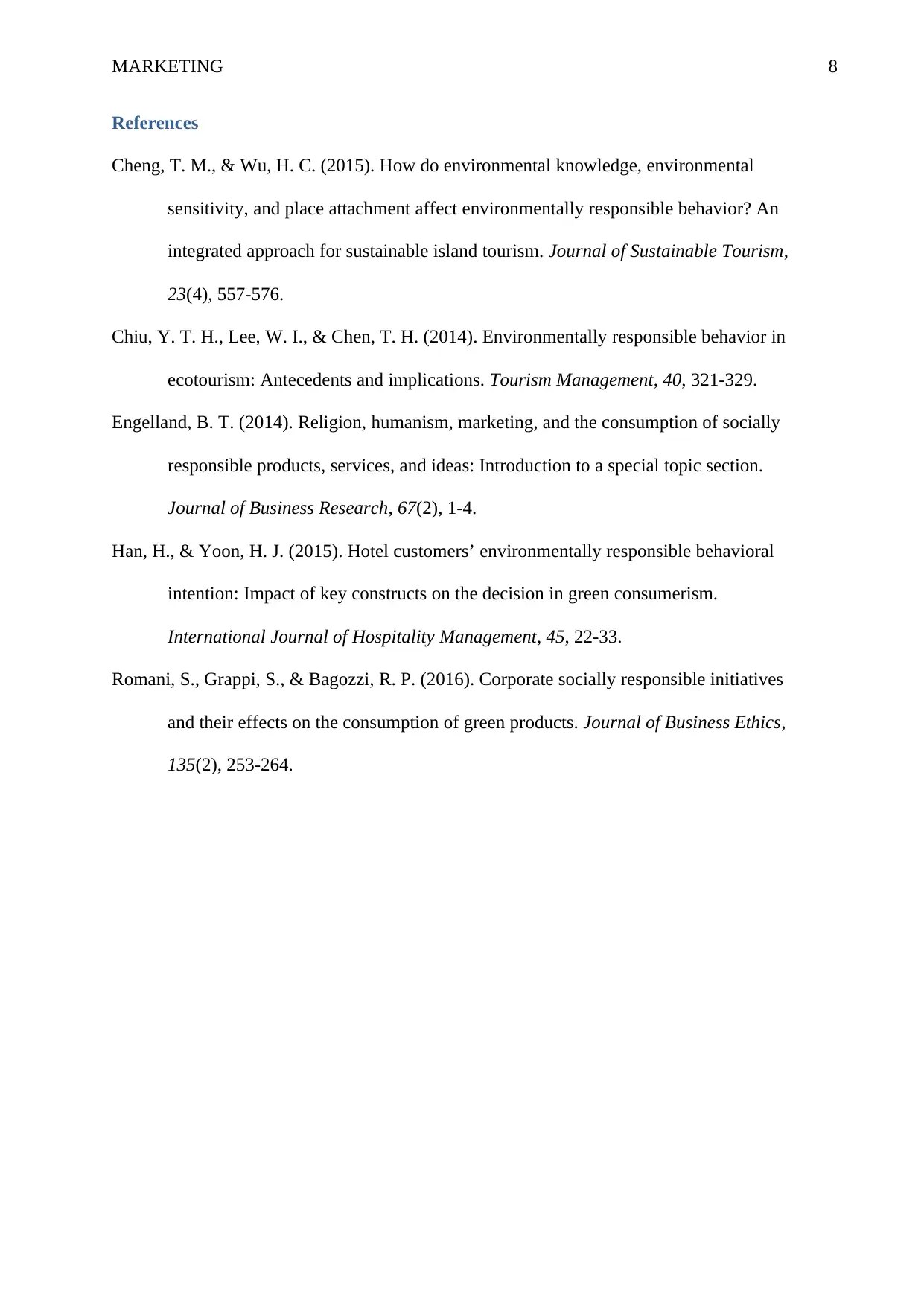
MARKETING 8
References
Cheng, T. M., & Wu, H. C. (2015). How do environmental knowledge, environmental
sensitivity, and place attachment affect environmentally responsible behavior? An
integrated approach for sustainable island tourism. Journal of Sustainable Tourism,
23(4), 557-576.
Chiu, Y. T. H., Lee, W. I., & Chen, T. H. (2014). Environmentally responsible behavior in
ecotourism: Antecedents and implications. Tourism Management, 40, 321-329.
Engelland, B. T. (2014). Religion, humanism, marketing, and the consumption of socially
responsible products, services, and ideas: Introduction to a special topic section.
Journal of Business Research, 67(2), 1-4.
Han, H., & Yoon, H. J. (2015). Hotel customers’ environmentally responsible behavioral
intention: Impact of key constructs on the decision in green consumerism.
International Journal of Hospitality Management, 45, 22-33.
Romani, S., Grappi, S., & Bagozzi, R. P. (2016). Corporate socially responsible initiatives
and their effects on the consumption of green products. Journal of Business Ethics,
135(2), 253-264.
References
Cheng, T. M., & Wu, H. C. (2015). How do environmental knowledge, environmental
sensitivity, and place attachment affect environmentally responsible behavior? An
integrated approach for sustainable island tourism. Journal of Sustainable Tourism,
23(4), 557-576.
Chiu, Y. T. H., Lee, W. I., & Chen, T. H. (2014). Environmentally responsible behavior in
ecotourism: Antecedents and implications. Tourism Management, 40, 321-329.
Engelland, B. T. (2014). Religion, humanism, marketing, and the consumption of socially
responsible products, services, and ideas: Introduction to a special topic section.
Journal of Business Research, 67(2), 1-4.
Han, H., & Yoon, H. J. (2015). Hotel customers’ environmentally responsible behavioral
intention: Impact of key constructs on the decision in green consumerism.
International Journal of Hospitality Management, 45, 22-33.
Romani, S., Grappi, S., & Bagozzi, R. P. (2016). Corporate socially responsible initiatives
and their effects on the consumption of green products. Journal of Business Ethics,
135(2), 253-264.
1 out of 8
Your All-in-One AI-Powered Toolkit for Academic Success.
+13062052269
info@desklib.com
Available 24*7 on WhatsApp / Email
![[object Object]](/_next/static/media/star-bottom.7253800d.svg)
Unlock your academic potential
Copyright © 2020–2025 A2Z Services. All Rights Reserved. Developed and managed by ZUCOL.